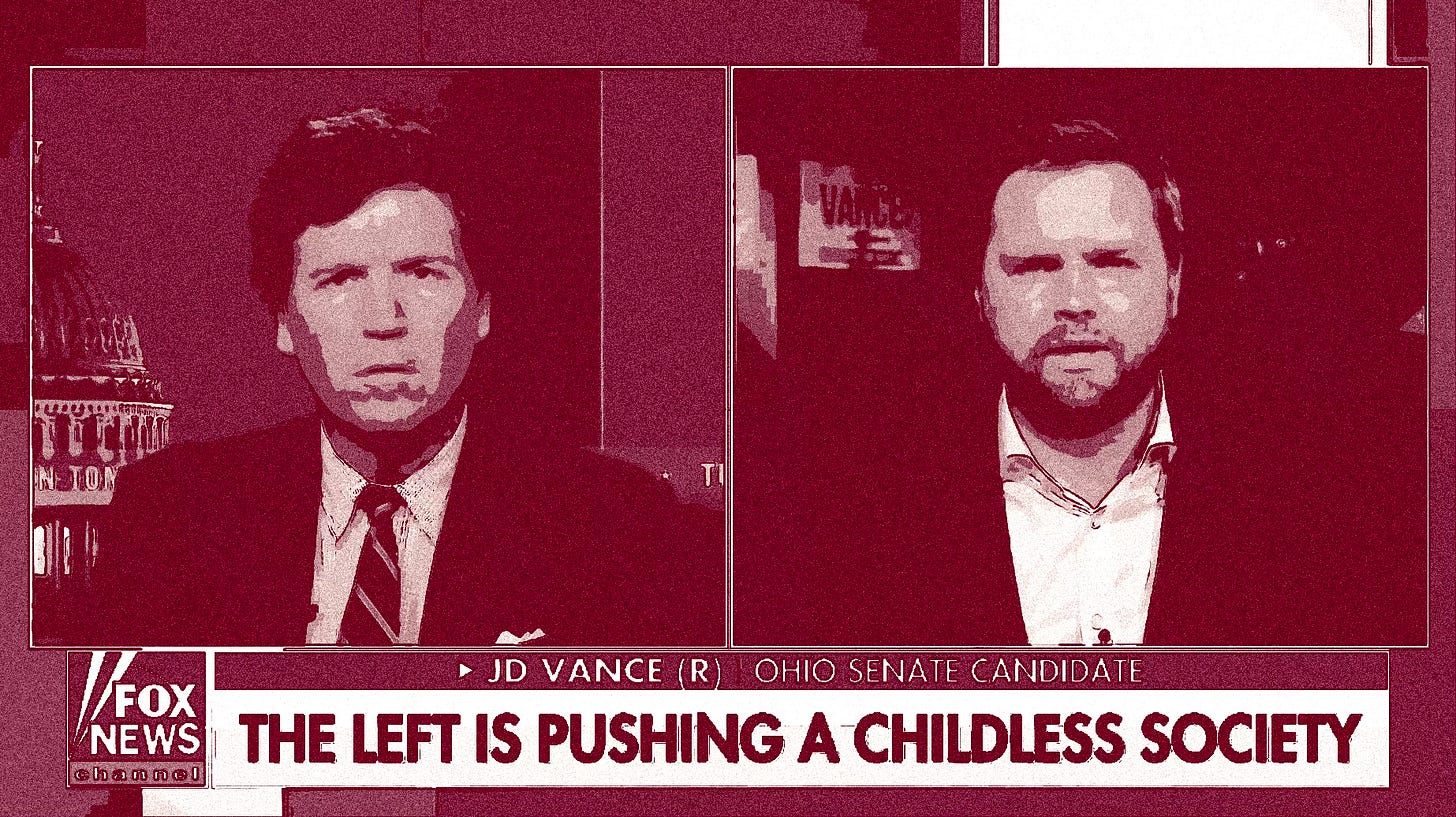JD Vance's Weird Plan to Disenfranchise Childless Cat Ladies
His proposal to give parents more votes won't protect minor children, only dilute the political power of a group he doesn't like

While running for the U.S. senate from Ohio three years ago, JD Vance inveighed against “childless cat ladies” during a broadcast of Fox News’ Tucker Carlson Tonight, a comment that went viral after he was named Donald Trump’s running mate on the 2024 Republican presidential ticket. These women, who Vance argued have been running the country alongside “corporate oligarchs” and the rest of the Democratic Party, are “miserable at their own lives and the choices that they've made and so they want to make the rest of the country miserable, too.” Expanding the critique to include childless men, Vance went on: “It's just a basic fact—you look at Kamala Harris, Pete Buttigieg, AOC—the entire future of the Democrats is controlled by people without children.” (Kamala Harris is a stepmom of two, Pete Buttigieg and his husband adopted twins shortly after Vance’s interview aired, and Alexandria Ocasio-Cortez was still years younger than Vance was at the birth of his first child.)
That’s not the only occasion that Vance has exhibited an odd and explicit hostility toward childless Americans. In another resurfaced clip from 2021, this time as a guest on far-right influencer Charlie Kirk’s podcast, Vance pushed the idea that we need to “punish the things we think are bad,” before offering his proposal to tax Americans who don’t have kids at a higher rate than Americans who do. As UnPopulist contributor and law professor Ilya Somin has pointed out, the problem wasn’t necessarily with the underlying policy—the child tax credit—but the needlessly punitive framing Vance gave to it, singling out a particular constituency for a social penalty rather than playing up the pro-family outcomes the provision is supposed to incentivize. But one of the strangest policy proposals motivated by Vance’s contempt for the childless is his contention that parents ought to receive an additional vote for each of their minor children during elections.
Vance isn’t the only one who has endorsed this policy. Notable leftist and independent presidential candidate Cornel West also thinks it’s a good idea (though his professed interest in helping children does not appear to extend to the tens of thousands of dollars he owes in unpaid child support). In a new paper, two law professors, Northwestern University’s Joshua Kleinfeld and Harvard’s Stephen E. Sachs, flesh out the idea in more detail. As they see it, parents “should be able to cast proxy ballots on behalf of their minor children.” Although there’s always some merit to thinking outside the box on structural reforms to our democracy, giving extra votes to parents fundamentally misunderstands the purpose and principles of free elections.
Parents Aren’t the Only Voters Who Care About Kids
The assumption underlying the proposals to give parents extra votes on behalf of their children is that, in American politics, the interests of children are underrepresented. But that’s a dubious premise. Governments at all levels in the United States spend huge sums on education, healthcare, benefits, and tax breaks for children, not to mention on laws and regulations to protect the health and safety of children. In total, these policies amount to public spending well into the six figures for every child from birth until adulthood. If children were indeed an electorally inert constituency, parties and politicians wouldn’t bother devoting so many resources to them. In other words, none of this spending would make sense if politicians and policymakers could ignore children simply because they can’t vote, the supposed problem extra votes for parents is intended to remedy.
The reality is adult voters, and not just those who have their own underage children, care a great deal about the well-being of children and generally support policies that enhance their welfare. After all, current parents of minor children are never a majority of voters, but it is self-evidently untrue that they’re the only people who care about children. In fact, the state has an important interest in sometimes checking the abuses of parents. Upholding those rights is a core function of government, one in which people who do not have their own children have a strong interest.
The “Proxy” Pretense
More importantly, this proposal is not about giving votes to children. It is about giving extra votes to parents. To say these extra votes are “proxy votes,” as proponents tend to frame the idea, is a fig leaf. The extra votes allocated would be cast by parents or other guardians, however they see fit, as an expression of their own political views. Parents who receive extra votes to cast “for their children” would be under no obligation to cast those votes any differently than they do their own. That’s true even if they’re party-line Republicans and their 17-year old is already a staunch progressive, or—less commonly—vice versa.
One adult person, one vote is not an arbitrary standard—it is a manifestation of legal equality, the core principle from which everything else flows. The franchise represents the equal interest we have as autonomous, equal members of society with an equal interest in the protection of our rights. That construct is only applicable to adults who actually are free agents; adults are free to read what they want, believe what they want, associate with whomever they want, form their own opinions, and freely express them. By aggregating the expression of these freely formed views, we have a kind of collective freedom in deciding how our self-governing society should function.
A genuine proxy vote, such as we sometimes see in legislative bodies, is a consensual arrangement. Individuals who have a vote in their own right delegate that vote to somebody else they have authorized to cast it. No such process plays out under the extra-votes-for-parents plan. That’s because minors do not have a vote in the first place. That means they cannot freely allocate their vote to anybody. It would be absurd to say children could revoke these extra votes if they disapprove of how their parents will use them, in the way actual proxy votes can be revoked. That inherent lack of consent makes it nonsensical to say this is really the child’s vote. The proposed extra votes instead belong to the adults, just as exclusively and absolutely as their own regular individual vote. Rather than proxy voting, the system proposed is more analogous to a number of discredited historical schemes for skewing the electorate by super-powering some class of voters and—as a corollary—either partially or fully disenfranchising others.
The Latest Idea in a Tradition of Skewed Democracy
The most notorious example in American history is the three-fifths compromise, where slaves were partially counted for congressional apportionment purposes, in effect heavily boosting the power of slaveowner votes. To be sure, the custodial guardianship of minor children is not morally akin to the horrors of chattel slavery. And it is reasonable to presume the votes of parents are much more aligned with the interests of their children than was the case for slaveowners and the human beings they purported to own. But in one respect it is a similarly odious claim: some voters have extra interest in the outcome of elections, so they should get extra votes; some people are more equal than others.
It is true, Kleinfeld and Sachs note, that children (and, for that matter, adults barred from voting) are also included in the apportionment of congressional and legislative seats. The Constitution requires this allocation to be based on the “whole number of persons” as determined by the decennial census. But the inclusion of children in that total is mathematically trivial. A reasonable case could be made that apportionment should be based on the number of voters rather than total population, as some have advocated. We should be skeptical of theories of “virtual representation.” But there is little practical difference, since there is no great geographic variation in how many children live in a given area; at least not enough to substantially affect apportionment. In the same way, legislative districts can never be perfectly equal in population. But we accept small deviations within reason because they are inevitable (up to 10% or more is common) so long as the substantive equality of all voters is preserved.
Most other advocates don’t believe this is tantamount to limiting the franchise—everyone can still vote, they note—but the effect is the same. Giving more votes to some people is inherently diluting the votes of other people, giving them a mere fraction of full say. John gets three votes while Sally gets one vote is the same thing as saying John gets one vote and Sally only gets one-third of a vote. The inherent inequality is laid bare simply by stating it in mathematically equivalent terms.
The reason all adults should be accorded a single equal vote in elections is because we all have a common interest in governance which is truly equal: the equal protection of our own rights as free individuals. This is also why disenfranchisement of felons who have completed their sentences is objectionable, and prone to blatantly partisan and racially discriminatory abuse. In the same vein, immigrants who have come to reside permanently in the United States should have reasonable and timely access to naturalization, granting full citizenship and thus the vote. But it would be a category error to say these groups are denied the vote in the same sense in which children are not allowed to vote.
As much as we rightly care about the well-being of minors, they do not yet share this essential attribute. That’s why they are not extended all the rights of citizenship, including equal protection of the laws, free speech, freedom of contract, freedom of association, or even freedom in general. All of those things kick in once they become adults, but in the meantime as wards of their legal guardians, they do not have them, at least not in full measure and especially not against their parents. So what is the logic of withholding these rights, essential to genuine participation in democratic decision-making, but claiming they have a right to vote? For the same reason, we should also be skeptical of proposals to lower the voting age below the age of adulthood, such as to 16, popular with some on the left.
The right to vote is one manifestation of the right to freedom in general. Minor children are a unique class who do have important rights—to be free from abuse and neglect, and for their custodial guardianship to be exercised in their best interests—but the right to freedom and legal equality with adults is not among them. Without that freedom, there can be no such thing as a right to vote, much less a right in some adults having more votes than others.
Why Stop At Extra Votes for Parents?
Once you open the door to picking and choosing which voters get more say than others, parenthood is hardly the only possible attribute you could choose to reward. Why not an extra vote for people with college degrees, since we want more educated people to have greater say? How about taxes paid—isn’t that a relevant interest we should accord extra weight to? Land ownership? Number of employees? Or how about age? Should 70-year olds who have a shorter amount of time to live with the consequences only have a fraction of a vote compared to 20-year olds with their whole life ahead of them? If we value religiosity, as many including Vance say they do, should churchgoers get an electoral boost over the irreligious? If you’re skeptical of immigration, as Vance is to a weirdly historical degree, should votes be weighted by the number of generations your ancestors have been in the United States?
If these arguments sound familiar, it’s because many of them were once common, alongside the more notorious disenfranchisements based on race and sex. Property requirements, poll taxes, university constituencies, class-based plural voting, and various other efforts to skew the electorate have all been relegated to the dustbin of history for good reason.
As notions of human equality and liberal democracy advanced, all such limited and unequal franchises became indefensible, rightly seen as a license to oppress those who were electorally disempowered. It is no coincidence that Vance’s advocacy is paired with an open disdain and hostility towards individuals towards those he memorably disparaged as “childless cat ladies.” He has also, in another clip that’s gone viral, agreed with the assertion that “the purpose of the post-menopausal female” is to help raise grandchildren, as if women (but notably not men) can have no “purpose” in leading their own lives.
In Vance’s social vision, those who share his conception of the good are first-class citizens, bestowed with extra voting power. From his perspective, diminishing the power of voters he disdains is a feature of his politics, not a bug. Denying the equal franchise, as it always has been, is ultimately about denying equal rights.
Copyright The UnPopulist, 2024.








I completely agree that giving extra votes to parents is undemocratic. But let's put that to the side. How do you allow parents — two people, with potentially different political leanings—an extra vote. Would each parent get an extra vote? Would they have to designate a votee? Would that right be revoked upon a child's untimely death? What about single moms? How would all these extra votes affect voter fraud, an issue that Republicans are super concerned about obstensibly?
It's a totally unserious idea.
The people in Vance’s party are already over represented. A vote in WY counts far more in the EC, and even more in the Senate, than a vote in CA (or my state, WA) does. Thanks to that over representation the wishes of the majority are routinely disregarded in favor of white rural/exurban minorities. This has had a significant negative impact on how Americans view their government.